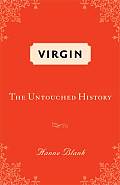This non-fiction examination of the history and nature of virginity is subtitled The Untouched History for more reasons than the obvious pun. This two-part book tackles both the science (such as there is) and social construction of virginity and in the process reveals just how little the topic has been seriously studied despite its supposed importance. Our understanding of virginity is full of urban legends, half-truths, anecdotal understanding, and hand-waving to a degree that's quite odd given the scientific study and analysis of the human body and the analysis of so many other social constructions.
Somewhat unfortunately, Blank doesn't let this point grow naturally out of her history and study and instead pounds it home at every opportunity to the point of preachiness. This is the largest flaw of the book, particularly noticeable in the first few chapters. I suppose it's hard to break through the feeling of incorrect knowledge and get the reader to accept the murky reality, but I still kept wishing Blank would move past the sermon and the "you don't actually know anything you think you know" tone and get on with the details.
Once she does, though, this book is fascinating. It's blunt, forthright, well-documented, and straightforward in its demolition of myths and folk wisdom, reading at times like a skeptical debunking of mysticism. I thought the chapters on the hymen and its borderline existence as a discernable body part were particularly effective. The ordering choice of laying out current medical knowledge and then showing the Renaissance discovery of the hymen gives the history a sadly amusing air, driving home both the degree of wackiness in Renaissance medical science and the sad extent to which much current folk wisdom is rehashings of earlier poorly-documented beliefs.
Concluding the medical portion of the book is a look at signs of virginity and a medical look at first intercourse, which is both infuriatingly incomplete and revealing in the reasons for that incompletion. Here, I think more than anywhere, the depth of our ignorance is the most apparent. We, at least according to Blank (and her presentation and research is convincingly thorough), have no firm idea and lots of partial theories of why some women have discomfort or bleeding after first intercourse. There's depressingly little real study, for a wide variety of reasons, and many women don't experience any discomfort whatsoever. This chapter is representative of the first half of the book: it's a combination of interesting research, frustrating lack of knowledge, and a touch too much preachiness about that lack of knowledge.
After the medical first half, Blank moves on to the social history and construction of virginity, including its role in Christianity, the origins of belief in the Virgin Mary, and the modern supporting extremes of virginity in porn and virginity (recast as "abstinence") as a moral crusade. This part of the book is equally fascinating, if lighter on memorable facts and heavier on more debatable interpretation. Here, the limitations of the size of the book show: the history of virginity in the Christian religion could easily spawn volumes (and has, although rarely so tightly focused), even apart from the much-discussed role of Mary in Catholicism. Blank has time for little more than a survey, interesting but a mere whetting of the appetite.
Blank concludes with a look at the modern mess of abstinence-only sex education, virginity pledges, and the other detritus of the culture wars. This is an eye-opening overview for those who were unaware of the depth of the Republican push in this area, and there are a few meaty bits of data (such as the evidence about the effectiveness of abstinence pledges: moderately effective, but only for a limited time and only if a minority with tight group identification has taken the pledge and hence used it as a method of group identity). However, Blank clearly has a personal stance on the subject (which matches mine), and I doubt this section of the book will surprise anyone who was already aware of the conflict or will change anyone's mind.
Throughout, apart from the unfortunate tendency towards preachiness, Blank has a clear and readable style. Virgin is blessedly well-written, making good use of paragraphs, sections, and chapters to break the material up into digestable chunks and flowing almost as well as a novel. One casualty of smooth and accessible prose is that citations and references are relegated to the back of the book and require some stitching together rather than being embedded in the text, but that's a tradeoff that I'll happily take.
I followed Blank's LiveJournal for much of the period while she was writing this book and had been waiting for it to be published, and I wasn't disappointed. The book as published represents an aggressive culling of all the material in the original manuscript, and Blank regaled her readers with comments about research, weird facts, and additional tidbits during the writing process. The Virgin Book Blog used to have a lot of the surrounding material, including large sections of text that were cut from the final book for length, but as of May of 2009 appears to be gone (alas).
By the way, it should be mentioned that this book is concerned almost exclusively with female virginity. The far more elusive and exclusively psychological concept of male virginity is touched on in passing but never given serious attention. This makes sense given the socioeconomic importance of female virginity and the completely different social construction of male virginity, but it's a bit surprising and not well-advertised by jacket blurbs.
Reviewed: 2007-10-18
